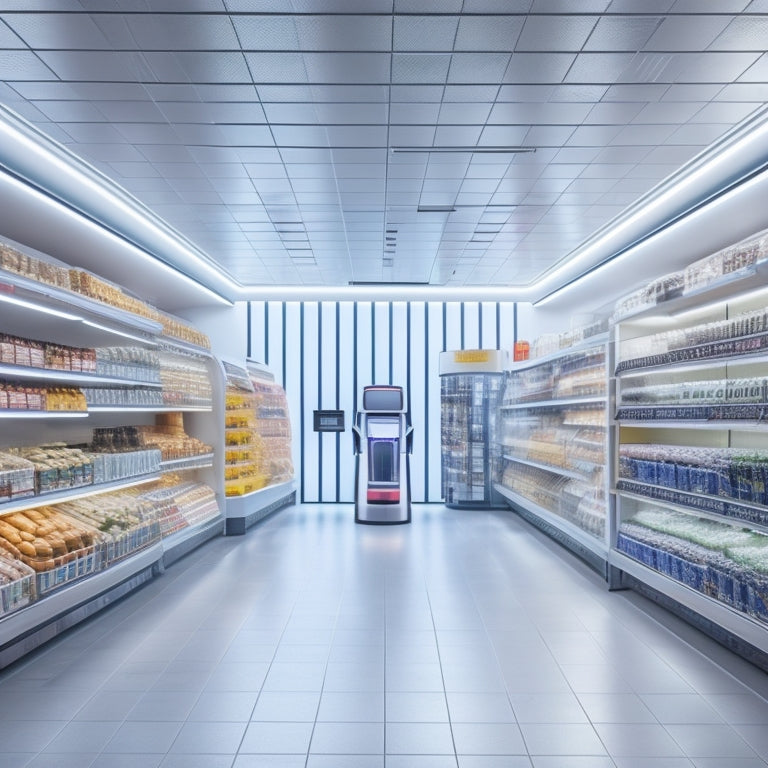
Revolutionizing Supermarkets: The Digital Goods Era
Share
The integration of digital goods into supermarket operations is poised to unleash a significant revenue boost, with estimates suggesting a 20-30% increase in revenue. This growth is driven by the lucrative nature of high-margin items like gift cards and digital subscriptions, which cater to the growing demand for digital content. However, with this opportunity comes the need to prioritize fraud prevention, as digital goods are prone to online transactions. By implementing advanced security solutions, supermarkets can maximize profits, enhance customer experience, and pave the way for a future where seamless integration of digital goods platforms and personalized promotions become the norm, revealing further possibilities.
Key Takeaways
• Incorporating digital goods can increase supermarket revenue by 20-30% through high-margin items like gift cards and digital subscriptions.
• Digital goods cater to the growing demand for digital content, providing a new revenue stream with lower logistical costs.
• Advanced algorithms and real-time detection systems are essential to prevent fraud in digital goods transactions and ensure revenue security.
• Seamless integration of digital goods platforms and advanced security solutions is key to shaping the future of digital retail.
• Personalized promotions and expanded product offerings can enhance customer experience and foster loyalty in the digital goods era.
Unlocking New Revenue Streams
By incorporating digital goods into their product offerings, supermarkets can access a lucrative market, tapping into an estimated 20-30% increase in revenue through high-margin items such as gift cards, game cards, and digital subscriptions. This strategic move enables retailers to maximize profits while enhancing customer experience.
Digital goods cater to the growing demand for digital content and services, providing a new revenue stream for supermarkets. With lower logistical costs compared to physical goods, digital products offer a high-margin opportunity for retailers to boost their bottom line.
Combating Fraud and Risk
Supermarkets venturing into the digital goods market must prioritize fraud prevention, as the anonymity of online transactions and the intangible nature of digital products make them an attractive target for fraudsters. To combat this, advanced algorithms and real-time detection systems are essential. These solutions enable retailers to identify and prevent fraudulent transactions, securing revenue and customer trust.
| Fraud Prevention Strategies | Benefits |
|---|---|
| Advanced algorithms | Accurate fraud detection |
| Real-time detection | Immediate response to fraudulent activity |
| Machine learning | Continuous improvement of fraud prevention |
The Future of Digital Retail
As retailers successfully combat fraud and risk, they can focus on shaping the future of digital retail. The seamless integration of digital goods platforms and advanced security solutions will redefine the shopping experience. By leveraging these technologies, retailers can enhance customer experience through personalized promotions, cross-selling, and smart recommendations.
Expanding product offerings will also become more feasible, allowing retailers to cater to diverse customer preferences and stay competitive. Additionally, advanced security solutions will guarantee a secure and trustworthy shopping environment, fostering customer loyalty and satisfaction.
As digital retail continues to evolve, retailers that adapt to these changes will thrive in the market, driving innovation and growth.
Frequently Asked Questions
How Do I Handle Digital Product Returns and Refunds?
To efficiently manage digital product returns and refunds, establish a clear Return Policy outlining eligibility, timelines, and refund amounts, and implement a streamlined Refund Process leveraging automation and minimal manual intervention to minimize losses and enhance customer satisfaction.
Can Digital Goods Be Bundled With Physical Products?
"Contrary to concerns about logistical complexities, digital goods can indeed be bundled with physical products, offering bundle deals that create hybrid experiences, driving average transaction value and customer satisfaction, while presenting new revenue streams for retailers."
Are There Any Specific Tax Laws for Digital Goods Sales?
When selling digital goods, retailers must navigate varying tax laws, including sales thresholds and tax exemptions, which differ by jurisdiction, necessitating careful compliance to avoid costly penalties and reputational damage.
Do Digital Goods Platforms Support Multiple Payment Methods?
"Unlocking a treasure trove of payment possibilities, digital goods platforms support a diverse array of payment options, ensuring secure transactions and seamless checkout experiences, thereby fostering customer convenience and confidence."
Can I Sell Digital Goods Through My Existing E-Commerce Platform?
Yes, you can sell digital goods through your existing e-commerce platform by leveraging platform integration, which enables seamless digital shelfspace expansion, allowing you to capitalize on new revenue streams while minimizing operational disruptions.
Related Posts
-
The Rise Of Shoppable Video: Transforming Ecommerce
Shoppable video is revolutionizing the world of ecommerce, providing an immersive and inspiring shopping experience. ...
-

How Do I Optimize My Website for SEO Shopify
This article examines strategies for optimizing websites on the Shopify platform for search engine optimization (SEO...
-

How Do I Promote My Shopify on TikTok
The use of social media platforms for marketing purposes has become increasingly prevalent in recent years. One plat...

